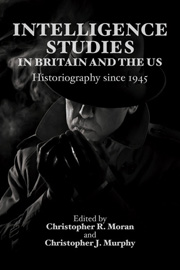Book contents
- Frontmatter
- Contents
- The Editors
- The Contributors
- List of Figures
- Preface
- Acknowledgements
- Introduction: Intelligence Studies Now and Then
- Part I AMERICAN INTELLIGENCE HISTORIOGRAPHY
- 1 CIA History as a Cold War Battleground: The Forgotten First Wave of Agency Narratives
- 2 The Culture of Funding Culture: The CIA and the Congress for Cultural Freedom
- 3 ‘Real Substance, Not Just Symbolism’? The CIA and the Representation of Covert Operations in the Foreign Relations of the United States Series
- 4 Bonum Ex Malo: The Value of Legacy of Ashes in Teaching CIA History
- 5 Narrating Covert Action: The CIA, Historiography and the Cold War
- 6 FBI Historiography: From Leader to Organisation
- 7 Reconceiving Realism: Intelligence Historians and the Fact/Fiction Dichotomy
- 8 The Reality is Stranger than Fiction: Anglo-American Intelligence Cooperation from World War II through the Cold War
- Part II BRITISH INTELLIGENCE HISTORIOGRAPHY
- Index
6 - FBI Historiography: From Leader to Organisation
from Part I - AMERICAN INTELLIGENCE HISTORIOGRAPHY
Published online by Cambridge University Press: 05 October 2013
- Frontmatter
- Contents
- The Editors
- The Contributors
- List of Figures
- Preface
- Acknowledgements
- Introduction: Intelligence Studies Now and Then
- Part I AMERICAN INTELLIGENCE HISTORIOGRAPHY
- 1 CIA History as a Cold War Battleground: The Forgotten First Wave of Agency Narratives
- 2 The Culture of Funding Culture: The CIA and the Congress for Cultural Freedom
- 3 ‘Real Substance, Not Just Symbolism’? The CIA and the Representation of Covert Operations in the Foreign Relations of the United States Series
- 4 Bonum Ex Malo: The Value of Legacy of Ashes in Teaching CIA History
- 5 Narrating Covert Action: The CIA, Historiography and the Cold War
- 6 FBI Historiography: From Leader to Organisation
- 7 Reconceiving Realism: Intelligence Historians and the Fact/Fiction Dichotomy
- 8 The Reality is Stranger than Fiction: Anglo-American Intelligence Cooperation from World War II through the Cold War
- Part II BRITISH INTELLIGENCE HISTORIOGRAPHY
- Index
Summary
In 1908, President Theodore Roosevelt established the Bureau of Investigation, later renamed the Federal Bureau of Investigation (FBI) in 1935. When J. Edgar Hoover assumed directorship of the organisation, he used his public relations perspicacity to oversee the careful construction of accounts from hired writers (see Figure 8). During his forty-eight years as Director, Hoover required writers to obtain his approval for access to the FBI's internal files. Subsequently, the few writers that dared to craft negative depictions of the Bureau relied solely on outside information gleaned primarily from embittered former agents and Congress; they could not access any of the Bureau's official information. Only after Hoover's death and upon the passage of the Freedom of Information Act (FOIA) did FBI scholarship gradually gain objectivity. In the 1970s, the Bureau began declassifying its internal files after the American public demanded transparency from federal law enforcement and intelligence communities following the discovery of such scandals as COINTELPRO, Operation CHAOS and Watergate. In 1974, historians gained access to FBI files through the Freedom of Information Act (FOIA). Only then did historians have the sources needed to construct critical, revisionist histories of the FBI. Newly available sources deepened historical understandings of the Bureau and shifted the narrative away from the image of one-dimensional, heroic ‘G-men’ braving danger on behalf of their impeccable Director, Hoover, towards nuanced depictions of an organisation struggling to maintain order and security amid challenges such as the Cold War, racism and postmodernism.
- Type
- Chapter
- Information
- Intelligence Studies in Britain and the USHistoriography since 1945, pp. 129 - 145Publisher: Edinburgh University PressPrint publication year: 2013



